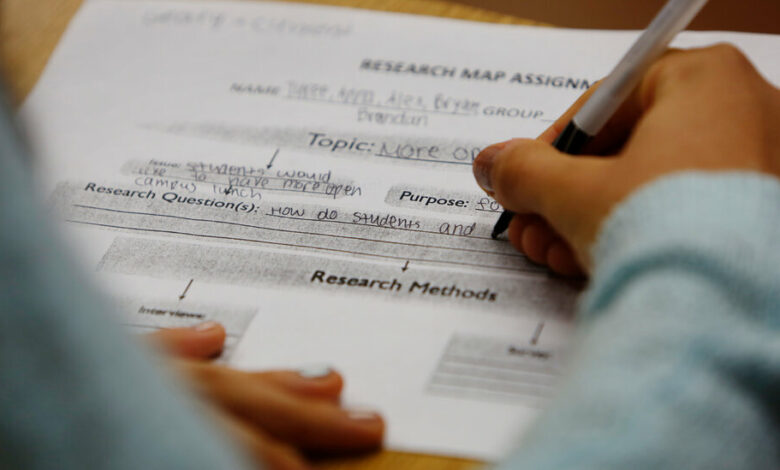California’s Push for Ethnic Studies Runs Into the Israel-Hamas War

California has grand ambitions for ethnic studies. By 2025, the state’s public high schools — about 1,600 of them — must teach the subject. By 2030, students won’t be able to graduate high school without it.
For policymakers, a goal is to give California students, 80 percent of whom are nonwhite, the opportunity to study a diverse array of cultures. Research has shown that ethnic studies classes can raise grades and attendance for teenagers at risk of dropping out.
But even in a liberal state like California, scholars, parents and educators have found themselves at odds over how to adapt the college-level academic discipline for high school students, especially because of its strong views on race and the Israeli-Palestinian conflict.
While the name “ethnic studies” might bring to mind a broad exploration of how ethnicity and race shape the human experience, the discipline, as taught in universities, is narrower — and more ideological.
Ethnic studies focuses on four groups: Black Americans, Latinos, Native Americans and Asian Americans. It aims to critique various forms of oppression and spur students to take action, often drawing analogies across disparate expanses of time and geography. The Palestinian experience of displacement is central to that exercise, and has been compared by some scholars to the Native American experience.
In reworking ethnic studies for high school, California came up with a 700-page model curriculum that captures much of the discipline’s leftist, activist spirit. But it added the stories of other ethnic groups, including Jewish Americans, while eliminating discussions of the Israeli-Palestinian conflict. It said lessons should include “multiple perspectives” on political issues.
Now some prominent ethnic studies scholars and educators say the state has bowed to political critics and censored their field. They are promoting a competing vision, which they call “liberated ethnic studies.” It is truer to how the subject is taught in colleges, but more politically fraught. It largely excludes the histories of ethnic groups, including Jews, who are typically understood as white within the discipline’s context. (Arab American studies is defined as fitting into Asian American studies.) And it offers lessons that are critical of Israel — and, some argue, antisemitic.
A number of California school districts are working with curriculum consultants who embrace liberated ethnic studies, while other districts are drawing upon these materials in creating their own classes.
The dueling approaches have prompted several lawsuits and sparked a heated debate: How should millions of California teenagers engage with these explicitly activist concepts in the classroom?
Resolutions to this question may shape education across the country. States including Oregon, Vermont and Minnesota plan to introduce K-12 ethnic studies in the coming years.
So, What Is Ethnic Studies?
At Edward R. Roybal Learning Center, a mostly Latino high school in Los Angeles, Guadalupe Cardona’s ethnic studies students have been keenly interested this year in tracing the shift in female archetypes in Mexican culture, from Aztec mythology to the legends of the Spanish conquistadores.
“A majority of my students have never even studied their own history,” said Ms. Cardona, a leader in the liberated ethnic studies movement.
Some students, she said, had also asked her about the Israel-Hamas war.
Ms. Cardona said she explained there had been a long dispute over land in the region — a dispute that would be better solved peacefully, she added.
And she considered the discipline’s approach to the topic clear.
“If someone is going to teach that conflict from a true ethnic studies perspective, it’s going to be critiquing settler colonialism in Palestine,” she said.
Ethnic studies grew out of student activism at Bay Area colleges in the late 1960s, when Black, Latino, Asian and Native American students went on strike to demand more focus on their groups’ histories and cultures.
Some activists were part of the Third World Liberation Front, a student group that linked racial segregation and discrimination in the United States to colonialism, imperialism and militarism across the globe.
For early scholars and students of ethnic studies, pro-Palestinian activism was also crucial, said Keith Feldman, chair of comparative ethnic studies at the University of California, Berkeley. Israel had recently captured Gaza and the West Bank, after defeating Egypt, Jordan and Syria in the Arab-Israeli War of 1967.
And some ethnic studies scholars have argued that the 1948 founding of Israel, in the immediate wake of the Holocaust, was part of the same general pattern of settler colonialism that brought white Europeans to the Americas and led to the displacement and genocide of Native Americans.
Those frameworks are “central to the ethnic studies approach,” said Dylan Rodriguez, an ethnic studies scholar at the University of California, Riverside.
Ethnic studies is not “a descriptive curriculum that speaks to various ethnic and racial groups’ experiences,” Professor Rodriguez said. “That is a bland form of multiculturalism.”
Instead, the discipline “is a critical analysis of the way power works in societies,” he said.
For those reasons, several ethnic studies scholars said in interviews, the Palestinian cause should be included in high school classes. It was important, they said, to stand in solidarity with Palestinian American students.
For critics, ethnic studies frameworks — such as categorizing Israeli Jews as European settlers — flatten the Jewish experience in ways that are inaccurate and, some argue, antisemitic.
About half of Israeli Jews identify as Mizrahi, meaning they have lived for hundreds or even thousands of years in the Middle East. And some Jews have always lived on the land that is now Israel, before 1948, among a Palestinian Arab majority.
There is a broad range of views in the Jewish community as to whether and when critique of Israel veers into antisemitism. Some draw a line at suggesting that Israel does not have the right to exist as a Jewish state.
“It’s not appropriate to teach students that Jews are colonizers and have engaged in, quote, ‘land-grabbing,’” said James Pasch, senior director for national litigation at the Anti-Defamation League, a Jewish group. “That course content will spread antisemitism throughout our high schools.”
When Professor Rodriguez was asked if students enrolled in ethnic studies classes should encounter a competing perspective of Israel’s founding — as a refuge for an oppressed people with deep roots in the region — he acknowledged Jewish ties to the land, and said he was not opposed to assigning writing by Zionists.
But he contested the notion of ideological balance in the curriculum, saying, “It creates false equivalences.” He then asked if creationism should be covered in biology classes, or climate change denialism in environmental science.
Asked if he was comparing Zionism to creationism or climate change denial, Professor Rodriguez responded, “Analogies are not comparisons. I am not saying these are the same thing.”
“A rigorous study of the creation of Israel,” he added, “requires a painful coming to terms with certain historic facts. I would analogize that to learning the history of slavery.”
A Curriculum Rewritten
The first draft of the state model curriculum, written by ethnic studies scholars and educators and released in 2019, reflected the discipline’s investment in the Palestinian cause. The draft rarely mentioned Jewish history and antisemitism, but touched repeatedly on the Boycott, Divestment and Sanctions movement to pressure Israel.
After fierce pushback from Jewish groups, the state revised the draft several times, publishing a final version in 2021. Even though all high schools will have to offer ethnic studies, the lessons in the framework are optional. Schools have the choice to incorporate ethnic studies either as a stand-alone course or by adding an ethnic studies lens to subjects such as history or literature.
Still, many schools are looking toward the model curriculum for direction. It retains the discipline’s leftist, activist bent, but is wide-ranging and, arguably, unwieldy. It covers white flight, Japanese internment, California farmworkers and anti-Arab bias. There is new content on groups who felt left out from the first draft, including Sikhs, Armenians and Mizrahi Jews.
At the same time, the state removed explicit discussion of the Israeli-Palestinian conflict. And in response to concerns about bias against Jews and Israel, the 2021 law adopting the curriculum included “guardrail” language, saying classes must “not reflect or promote, directly or indirectly, any bias, bigotry or discrimination.”
Some ethnic studies advocates have said that language threatens academic freedom.
“Guardrails are an attempt to equate criticism of Israel with antisemitism,” said Lara Kiswani, executive director of the Arab Resource and Organizing Center in San Francisco. “It was very clear from the onset of the attacks: It was about erasing Palestine.”
Liz Sanders, a spokeswoman for the California Department of Education, noted that while local school districts have control over their curriculums, state guidelines are clear: The Israeli-Palestinian conflict is a recommended topic for discussion in world history courses, but not in ethnic studies.
That said, Ms. Sanders acknowledged, there is no mechanism to enforce the guardrails and no consequence for breaking them.
In the Classroom
Ethnic studies has come under fire from conservative groups that are trying to eliminate lessons about critical race theory and systemic racism, key concepts in the discipline.
And even before the start of the Israel-Hamas war, some Jewish organizations were also closely scrutinizing high school ethnic studies courses, concerned the state guardrails would be breached.
With many districts already offering the subject — and teachers exercising autonomy in their approach — there has been no shortage of flash points.
Last spring, the school board in Santa Ana Unified, in Orange County, approved a 10th-grade ethnic studies class that covers the displacement of Native American tribes, gentrification in American cities and early 20th-century Russian pogroms of Jews.
But the syllabus veers from the state framework by including Israel’s treatment of Palestinians in a unit on colonialism.
In September, the Anti-Defamation League and several other Jewish groups sued the district on procedural grounds to prevent that material from being taught. A spokesman for the district said he could not comment on ongoing litigation, but noted that the course has not been offered, and that content was still being finalized.
In November, several weeks after the Oct. 7 Hamas attack on Israel, an ethnic studies teacher at Menlo-Atherton High School, in Silicon Valley, presented a lesson that inaccurately claimed the United Nations considered the creation of Israel illegal. (A U.N. resolution partitioned the territory into Jewish and Arab states, and the U.N. admitted Israel as a member in 1949.)
In addition, a slide depicted a hand manipulating a puppet, recalling antisemitic tropes about secret Jewish control of government, the media and finance.
Jewish parents protested, saying the lesson violated the anti-bias guardrails.
The Sequoia Union High School District, home to Menlo-Atherton High School, did not respond to interview requests. The teacher who taught the lesson said in an email that she was open to reteaching it to include “other perspectives,” but that she and the district disagreed about how to do so.
Sequoia Union is under pressure from the Deborah Project, a legal group focused on antisemitism, which has filed a public records request for lesson plans and communication among teachers.
The Deborah Project and other pro-Israel organizations have also zeroed in on several consulting groups whose founders helped produce the state’s 2019 draft curriculum, which was rejected after antisemitism accusations.
The consulting groups have hosted training sessions for educators and sometimes post on social media about the Israel-Hamas war.
One group, the Liberated Ethnic Studies Model Curriculum Consortium, offers free model lessons to schools, on topics such as the abolitionist John Brown’s raid, mass incarceration and gender expression, which are all part of the state’s framework.
But it also offers a lesson on Arab American issues that begins by comparing Palestinians to Native Americans in a “land acknowledgment,” which typically recognizes the Indigenous population where an event is taking place, and references the theft of that land.
A slide displays maps of Israel and the Palestinian territories, showing what it calls “Palestine land loss” between 1917 and 2016, without any information about the conflicts, wars or U.N. resolutions that shaped these maps.
There are references to finding common ground. The lesson highlights Edward Said, the Palestinian American literary scholar and theorist of settler colonialism. A slide states, “Said argued in favor of the political legitimacy and right to a Jewish homeland; but also on the right of the Palestinians for self-determination.”
It is unclear how many districts plan to use these lesson plans. But a review of district websites and board of education documents showed at least a half-dozen have either hired consultants affiliated with the liberated ethnic studies vision, or posted liberated ethnic studies materials.
Theresa Montaño, a Chicano studies scholar at California State University, Northridge, and a founder of the Liberated Ethnic Studies group, declined to say how many districts the group works with. She emphasized that the group does not promote a one-size-fits-all approach, but helps schools create lessons relevant to their local communities.
The Deborah Project has filed a federal civil rights lawsuit against Dr. Montaño’s group, the Los Angeles teachers’ union and the Los Angeles Unified School District, to try to prevent liberated ethnic studies materials from being taught. Ms. Cardona, the L.A. teacher, is also named.
A spokeswoman for the district said it had not hired any consultants affiliated with Dr. Montaño’s organization.
Lori Lowenthal Marcus, the Deborah Project’s legal director, said the group would probably file more lawsuits in the coming months.
Some legislators are also pushing back.
Scott Wiener, a Democratic state senator who helped craft the anti-bias guardrails, said he still supports ethnic studies, including lessons about Palestinian American immigrants.
“But,” he added, “picking one foreign conflict to teach intensively about and demonize one side — that is the home of one-half of all Jews on the planet — is very problematic.”
Audio produced by Sarah Diamond.




